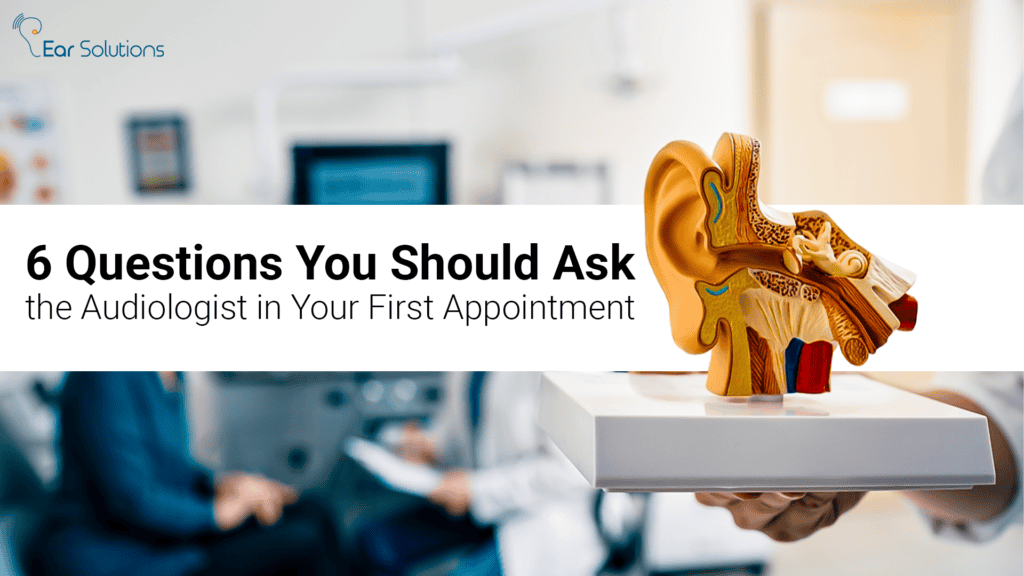Hearing health is a critical aspect of overall well-being, yet it is often overlooked until problems become noticeable. If you suspect you have hearing loss or have been referred to an audiologist, your first appointment is a crucial step toward understanding and addressing your hearing needs. Knowing what to ask during this initial consultation can help you make informed decisions about your hearing health. Here are six essential questions to ask your audiologist in your first appointment.
1. What Type and Degree of Hearing Loss Do I Have?
Understanding the specifics of your hearing loss is the first step towards effective treatment. Hearing loss can vary greatly in type and severity, and each type requires different management strategies.
There are three main types of hearing loss: conductive, sensorineural, and mixed.
Conductive Hearing Loss: This occurs when sound cannot pass through the outer or middle ear. It can be due to ear infections, fluid in the middle ear, or earwax buildup.
Sensorineural Hearing Loss: This results from damage to the inner ear or the auditory nerve. It is often caused by ageing, exposure to loud noise, or genetic factors.
Mixed Hearing Loss: A combination of conductive and sensorineural hearing loss.
The audiologist will conduct a series of tests to determine the type and degree of your hearing loss. Understanding this will help you know what to expect in terms of treatment and prognosis.
2. What Are My Treatment Options?
Once your audiologist has diagnosed your hearing loss, the next step is to discuss treatment options. Treatments can range from medical interventions to hearing aids or other assistive devices.
Some common treatments include:
Hearing Aids: These are the most common treatment for sensorineural hearing loss. Your audiologist can explain the different types and features available, such as in-the-ear, behind-the-ear, and completely in-canal models.
Cochlear Implants: For severe to profound sensorineural hearing loss, cochlear implants may be recommended. These are electronic devices that bypass damaged parts of the inner ear and directly stimulate the auditory nerve.
Medical or Surgical Treatments: For conductive hearing loss, medical treatments or surgeries (like earwax removal, antibiotics for infections, or surgical repair of the ear structures) may be necessary.
Ask your audiologist to explain the pros and cons of each option, including the cost, maintenance, and expected outcomes.
3. How Will My Hearing Loss Progress Over Time?
Hearing loss can be a progressive condition, and understanding its trajectory can help you plan for the future.
Some questions to consider include:
Is my hearing loss likely to worsen?
How quickly might my hearing decline?
Are there specific factors that could accelerate my hearing loss?
Your audiologist can provide insights based on your specific type of hearing loss and its underlying causes. This information can help you take proactive steps to protect your remaining hearing and prepare for potential changes.
4. What Can I Do to Protect My Hearing Going Forward?
Prevention is a key component of managing hearing health, even after hearing loss has been diagnosed. Your audiologist can offer personalized advice on protecting your hearing.
This might include:
Noise Protection: Using earplugs or earmuffs in noisy environments, reducing exposure to loud sounds, and maintaining safe listening levels when using headphones or earbuds.
Healthy Lifestyle Choices: Maintaining a healthy diet, exercising regularly, and avoiding smoking, as these factors can influence hearing health.
Regular Check-Ups: Scheduling periodic hearing tests to monitor any changes in your hearing and adjust treatment as needed.
Discuss any specific activities or environments that might pose a risk to your hearing and ask for tailored advice on minimizing those risks.
5. How Can Hearing Aids Improve My Daily Life?
If hearing aids are recommended, understanding their impact on your daily life is crucial.
Ask your audiologist:
How will hearing aids improve my ability to communicate and participate in social activities?
What specific features should I look for in a hearing aid based on my lifestyle (e.g., Bluetooth connectivity, rechargeable batteries, noise reduction)?
What adjustments might be needed initially to adapt to using hearing aids?
Hearing aids can significantly enhance your quality of life by improving your ability to hear conversations, enjoy music, and engage in various activities. Understanding their benefits and limitations will help you set realistic expectations.
6. What Support and Follow-Up Services Do You Offer?
Effective hearing care doesn’t end with the fitting of a hearing aid or other device. Ongoing support and follow-up are essential for optimal hearing health.
Ask your audiologist about:
Follow-Up Appointments: How often should you schedule follow-ups to monitor your hearing and adjust your devices?
Hearing Aid Maintenance and Repairs: What services are available for maintenance, repairs, and adjustments of your hearing aids?
Educational Resources: Are there resources or programs available to help you and your family understand and manage your hearing loss better?
Knowing what support is available can give you peace of mind and ensure you have access to the help you need to manage your hearing health effectively.
Where to find the best audiologist?
You can meet an expert audiologist near you at the Ear Solutions hearing aid clinic. We have been working for decades in the field of the hearing aid industry. And have served millions of individuals. We not only offer top-notch hearing aid machines but, we also provide you with the best services in India. You can book your free appointment and meet one of our expert audiologists who will help you find an ideal hearing solution to overcome hearing loss.
Conclusion:
Your first appointment with an audiologist is a vital step in addressing hearing loss and improving your quality of life. By asking these six questions, you can gain a comprehensive understanding of your condition, explore your treatment options, and develop a proactive plan for managing your hearing health. Remember, hearing loss is a common condition, and with the right support and information, you can effectively manage it and continue to enjoy a rich, fulfilling life.
Taking charge of your hearing health starts with being informed and prepared. Use your initial audiologist appointment as an opportunity to gather as much information as possible and build a foundation for effective hearing care. Your journey to better hearing begins with the right questions and the right support.

Prerna Singh
Audiologist, Ear Solutions
Prerna Singh is an Audiologist at Ear Solutions, focused on delivering compassionate, patient-centric hearing care. She works closely with individuals to understand their hearing concerns and guide them toward practical, technology-driven solutions that improve everyday communication and confidence.
At Ear Solutions, Prerna supports the organization’s long-standing mission of transforming lives through better hearing. She is committed to hearing awareness, accurate assessments, and continuous patient support-ensuring every individual receives the care they need to hear better and live better, in line with the vision of #AbSabSunenge.





